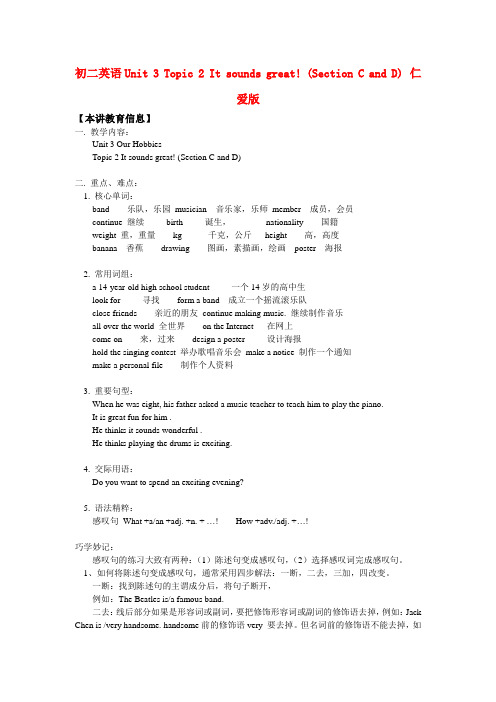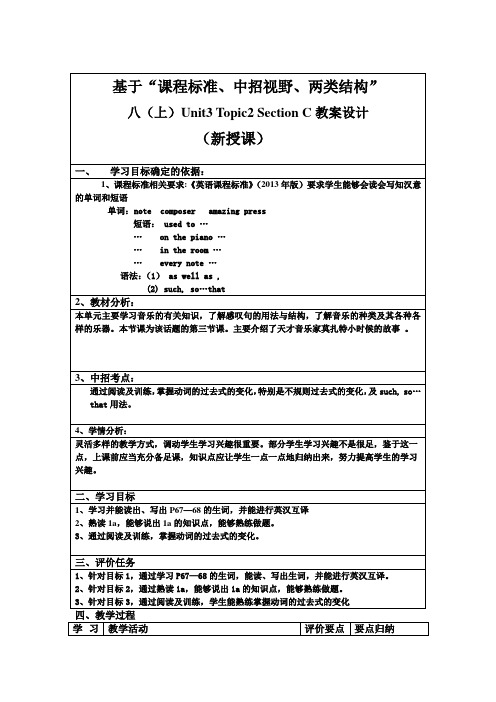仁爱八年级上Unit 2 Topic 3 Section CD
- 格式:doc
- 大小:33.50 KB
- 文档页数:3

初二英语Unit 3 Topic 2 It sounds great! (Section C and D) 仁爱版【本讲教育信息】一. 教学内容:Unit 3 Our HobbiesTopic 2 It sounds great! (Section C and D)二. 重点、难点:1. 核心单词:band 乐队,乐园musician 音乐家,乐师member 成员,会员continue 继续birth 诞生,nationality 国籍weight 重,重量kg 千克,公斤height 高,高度banana 香蕉drawing 图画,素描画,绘画poster 海报2. 常用词组:a 14-year-old high school student 一个14岁的高中生look for 寻找form a band 成立一个摇流滚乐队close friends 亲近的朋友continue making music. 继续制作音乐all over the world 全世界on the Internet 在网上come on 来,过来design a poster 设计海报hold the singing contest 举办歌唱音乐会make a notice 制作一个通知make a personal file 制作个人资料3. 重要句型:When he was eight, his father asked a music teacher to teach him to play the piano.It is great fun for him .He thinks it sounds wonderful .He thinks playing the drums is exciting.4. 交际用语:Do you want to spend an exciting evening?5. 语法精粹:感叹句What +a/an +adj. +n. + …! How +adv./adj. +…!巧学妙记:感叹句的练习大致有两种:(1)陈述句变成感叹句,(2)选择感叹词完成感叹句。

Unit 2 topic 3 sectionC 保持健康(康康的爸爸李医生正在给同学们做一份关于健康的报告。
)你们需要养成健康的饮食习惯。
早餐为你们上午(的学习)提供足够的能量。
因此不要不吃早餐上学。
水果和蔬菜有益于你们的健康,而像薯条之类的快餐食品可能会使你们肥胖而不健康。
因此合理饮食才能保持健康。
做运动也可以帮助你们保持健康。
但是有时候可能会发生事故,因此当你们做运动的时候,要确保安全。
而且有必要了解有关急救方面的知识,一边事故发生时,你们能自救或救助别人。
快乐对你们的健康很重要。
它是一剂良药。
当你们生病的时候,要尽量保持心情愉快,那样你们会感觉你们好多了。
另一方面,如果你们总是不开心,你们可能会不舒服。
因此,想健康就得快乐。
你们必须远离烟酒。
许多学生认为抽烟喝酒很酷。
可是他们并不知道抽烟喝酒会引起很多疾病。
你们应该对烟酒说不。
Unit 2 topic 3 section D 怎样很好的锻炼●热身在你锻炼之前热身很重要。
在你做一些费力的像跑步这样的运动之前,你需要伸展你的腿、胳膊、背和脖子。
●找好地方锻炼你不需要再锻炼上画很多钱。
你可以在公园或你学习的体育馆跑步或做运动。
你不需要在家里买健身器材。
只需让你的身体动起来。
●不要锻炼过度选择一项你喜欢的运动,那么锻炼就会有趣的代替工作。
并且,每个星期你只需要锻炼几次。
去过你每次锻炼三十分钟,你就会很健康。
●喝足够的水当你锻炼的时候喝水很重要。
你的身体需要水来不吃能量和保持凉爽。
●小心如果你在锻炼的时候伤着了自己,一直休息到你感觉好点。
在受伤时锻炼对你的健康有害。
Unit 3 topic 1 section c制作剪贴簿是一种爱好。
它在500多年中都很受欢迎。
人们称之为友谊簿。
他们把想要记住的图片、信件、是个、以及其他物件都保存下来。
现在的人们在剪贴簿中收集很多东西。
有些人的收集很有趣,像世界上最愚蠢的主意或世界上最丑陋的狗的照片。
还有些人可能收集有关恶劣天气的故事。

仁爱版英语八年级上册Unit 3 Topic 2《What sweet music》(SectionC)说课稿一. 教材分析仁爱版英语八年级上册Unit 3 Topic 2《What sweet music》(Section C)是一篇关于音乐欣赏的阅读材料。
通过讲述一篇关于一位音乐家和他的音乐的故事,让学生在阅读过程中感受音乐的美丽,提高他们的阅读理解能力和音乐鉴赏能力。
此篇课文内容丰富,语言优美,贴近学生生活,有助于激发学生对音乐的热爱。
二. 学情分析八年级的学生已经具备了一定的英语基础,对音乐有一定的了解和兴趣。
但他们在阅读理解、词汇运用和音乐鉴赏方面还存在一定的困难。
因此,在教学过程中,教师需要关注学生的个体差异,充分调动学生的积极性,引导他们主动参与课堂活动。
三. 说教学目标1.知识目标:让学生掌握 Section C 课文中的关键词汇和句型,提高阅读理解能力。
2.能力目标:培养学生运用英语进行交流的能力,提高音乐鉴赏能力。
3.情感目标:激发学生对音乐的热爱,培养他们欣赏美好事物的能力。
四. 说教学重难点1.教学重点:课文的理解和词汇的掌握。
2.教学难点:音乐术语的理解和运用,阅读策略的培养。
五. 说教学方法与手段1.教学方法:采用任务型教学法,让学生在完成任务的过程中提高英语运用能力。
2.教学手段:利用多媒体课件、音频和视频材料,激发学生学习兴趣,提高课堂效果。
六. 说教学过程1.Pre-reading:引导学生谈论自己对音乐的喜爱,激发学习兴趣。
2.While-reading:分组阅读课文,讨论课文内容,回答问题。
3.Post-reading:学生展示自己的音乐作品,进行音乐欣赏和评价。
七. 说板书设计板书设计应简洁明了,突出重点。
可采用思维导图的形式,将课文内容、关键词汇和音乐术语进行整理,帮助学生巩固记忆。
八. 说教学评价1.课堂参与度:观察学生在课堂活动中的积极参与情况,评价他们的学习态度。

八年级上册第二单元Topic 3 SectionA-B一、重点句型及知识点讲解1. May I ask you some questions, Dr. Li ? ---- Sure, go ahead. 我能问你一些问题吗,李医生?当然,请问吧。
(1) 1)疑问句和否定句中,表“一些”,常用any, 不用some. 但当此疑问句表建议或请求时,Some不改成any. 如:Would you like some tea ?2)question意为“问题,疑问”,指较易解决的问题及口头回答的问题。
如:Can you answer the question?你能回答这个问题吗?【辨析】problem和question都当“问题”讲,但它们是有区别的。
Problem 通常指难以解决的问题,尤指比较困难的问题,如社会、政治和经济等。
与它搭配的动词一般是work out或solve;而question常指对某事疑惑不解需要寻找答案的问题,它常与动词ask或answer搭配使用。
如:We must solve the problem of heavy traffic in Beijing as soon as possible.我们必须尽快解决北京的交通拥挤问题。
This is a difficult question to answer.这个问题很难回答。
(2) Sure , go ahead 当然可以,请问吧!Go ahead.(口语)表示同意对方的请求,根据情况可译为“说吧”!“做吧”! 如:__Can I read the sports section ? 我可以看看体育版吗?__Yeah, go ahead.请看吧!【拓展]】(1)go ahead and do sth .赶紧做某事。
如:Go ahead and eat before everything gets cold.趁东西还没凉赶紧吃。
(2)go ahead of 在……之前去。


Unit2 Keeping healthyTopic3 Must we exercise to prevent the flu?一、重点短语1. hurry up 快点,赶快2. go ahead(尤指经某人允许)开始,干下去,走在前面,领先3. do more exercise 多锻炼4. do some cleaning 做扫除5. all the time 一直6. have to 不得不,必须7. keep away 远离...8. just a moment 稍等一会儿9. get through 拨通(电话);通过10. take care of 照顾11. care for 照顾(病人);照料;喜欢12. talk with 和...交谈13. enjoy oneself 过得愉快14. Chinese medicine 中药15. since then 从那时起16. get lost 丢失了,迷路17. on one's way to... 在某人去...的路上18. by mistake 错误地19. ask for leave 请假20. healthy food 健康食物21. crowded places 拥挤的地方22. do one`s best 尽力23. change clothes often 常换衣服24. wash hands often 常洗手25. ring...up 打电话给...26. leave a message 留口信27. take a message 带口信28. call...back 给...回电话29. take an active part in 积极参加30. the name of... ...的名称31. what do you think of...? 你认为...怎么样?32. have a good time=enjoy oneself 过得愉快33. next time 下次34. let...out 让...出去35. teach oneself on the Internet 网上自学36. be afraid of 害怕...,恐惧...二、重点句型Section A1. Mom, hurry up ! Dad is on TV.①hurry up 赶快,表催促②hurry to do sth. = do sth. in a hurry 匆忙地做某事He hurried to finish the work. = Hefinished the work in a hurry.③ hurry to+某地:表匆匆地去某地,如:He hurried to the hospital.= He went to the hospital in a hurry. (2) be on TV 某人或某事物上电视。
Unit3 Topic2 SectionD优质课教案泉州第一中学洪亦然I. Material analysis本课选自仁爱英语八年级上学期Unit 3 Topic2 SectionD,课型为复习课。
主要内容分为三部分:①复习感叹句的用法,意在引导学生发现规律,自主总结;②阅读训练,了解不同的人有不同的音乐喜好,旨在训练学生采用联想、猜测、寻读、归纳的阅读策略,了解大意,关注细节,体验日常生活中音乐带给人们的感受;③在总结Topic2句型表达法的基础上,创设情境,通过设计校园艺术节演唱会,鼓励学生畅谈自己喜爱的音乐类型,并邀请自己喜爱的明星或老师一起参加,带动文本升华,完成语言输出。
II. Students analysis初二的学生具有较强的求知欲和探索精神,对生活现象及热点话题有自己独到的见解,不足之处在于仍然缺少语言输出的胆量与知识储备,因此要求教师注重铺垫与引导。
本课是复习课,鼓励学生在反复操练中自主总结语法规律,分析阅读材料的大意与细节,畅谈自己对校园音乐会的设计,让学生成为课堂的主人,体验自主学习的成就感。
教师的主要任务是通过文本问题化、问题活动化的方式,优化学生的学习潜力和思维方式。
III. Teaching aims:1. Knowledge aims:(1)Master some new words: peace, culture, own, south(2)Practice making exclamation.(3)Get to know different people have different tastes of music.2. Ability aims:(1)Students are supposed to sum up the use of exclamatory sentences.(2)Students are expected to catch the useful clues from reading and fill in the information table.(3)Students are expected to talk about their favorite music.3. Emotional aims(1)Encourage students to enjoy the pleasure of music in everyday life.(2)Encourage students to share their likes and dislikes in public.IV. Teaching points1. Key points(1)Practice making exclamation.(2)Get to know different people have different tastes of music.2. Difficult points(1)Sum up the use of exclamatory sentences.(2)Talk about their favorite music.V. Teaching approachTask-based and communicative approachVI. Teaching aidsMulti-media, pictures and blackboardVII. Teaching procedureStep 1. Lead-in (2 min)1. Enjoy an English song Try Everything to warm up2. Greeting and get students to know the competition rules.<设计意图:以英文歌曲Try Everything 开篇,契合本课主题music帮助学生尽快融入课堂氛围。
初二英语练习
Unit Two Topic Three Section C D
Ⅰ.根据首字母提示完成句子。
1. If you know the a , you can hand up.
Come on, baby. Don’t be afraid. You must be b .
3. Nobody teaches Li Hua English. She has to teach h .
4. A young man jumped into the river and s the little boy.
5. It’s our d to clean the classroom everyday.
Ⅱ. 根据汉语提示完成句子。
1. (快点), or we’ll be late for the train.
2. Must we keep the window open (一直)?
3. First, we should (增强体质) our bodies to prevent diseases.
4. We should have healthy (饮食习惯).
5. Jim learned Chinese on the Internet (自学) last year.
Ⅲ. 用所给词的适当形式填空。
1. We should take care of (oneself) when we climb mountains.
2. The good news (spread) very fast. We all know it now.
3. He (save) a patient’s life from a serious illness.
4. We should do something to help boys keep away from (play) computer games. Ⅳ. 单项选择。
1. There are several students in our school.
A. hundred
B. hundred of
C. hundreds of
D. hundreds
2. It’s raining hard outside. I’m afraid you wait for a while.
A. must
B. have to
C. can
D. may
3. What should we do when fires (火灾) ?
A. come out
B. break out
C. take out
D. go out
4. The nurses should care the patients day and night.
A. of
B. off
C. for
D. in
5. You’d better do more exercise to .
A. build yourself
B. build up you
C. build up yourself
D. build yourself up Ⅴ. 翻译。
1. 我们都了解一些保持健康的方法。
2. 服下这些药,我们都感觉好些。
3. 跑步有助于我们增强体质。
4. 他们此刻正在忙着打扫卫生。
5. 你没必要放弃喝牛奶。
参考答案:
Ⅰ.根据首字母及汉语提示完成句子。
1.answer
2. brave
3. herself
4. saved
5. duty
Ⅱ. 根据汉语提示完成句子。
1. Hurry up
2. all the time
3. build up
4. eating habits
5. by himself
Ⅲ. 用所给词的适当形式填空。
1. ourselves 分析:反身代词是由前面的主语决定的
2. spread 分析:根据句意判断消息是先传开,所以用过去时
3. saved 分析:对事件的叙述改用过去时
4. playing 分析:keep away from doing sth.
Ⅳ. 单项选择。
1. A 分析:当hundred / thousand 前有数词或形容词修饰时,当作具体数字,不加s,后面直接跟名词。
而hundreds of前面不能用形容词修饰
2. B 分析:must表示个人主观的想法;have to表示由于各种原因造成的客观原因;can 表示能够,may表示可能,都不符合句意
3. B 分析:come out---出来;break out:常指火灾等灾难性的事件爆发;take out---取出;go out---出去
4. C 分析:固定搭配
5. D 分析:动副词组,代词必须放中间
Ⅴ. 翻译。
1. We all know something about how to keep healthy.
2. After taking the medicine, we all felt better.
3. Running can help build us up.
4. They are busy with cleaning at this moment.
5. You needn’t give up drinking milk.。